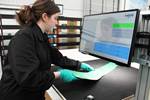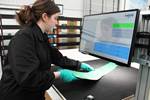Velocity Composites receives Nadcap accreditation for U.S. facility
Followed by certain site recertification in July, global industry verification of Velocity’s Tallahassee site ensures compliance with aerospace standards.
Aerospace composites specialist Velocity Composites (Burnley, U.K.) has passed the global industry accreditation at its U.S. site for those suppliers serving the industry and related sectors.
Nadcap accreditation — the globally recognized National Aerospace and Defense Contractors’ Accreditation Program — is an endorsement that Velocity’s robust processes and high product integrity meet or exceed the highest standards in the aerospace industry.
The accreditation for the company’s Tallahassee site in Alabama is a milestone for the facility, gaining approval within the first 12 months of first composites kit production.
The successful inspection also strengthens Velocity Composites’ audit history across its sites in Burnley, Lancashire and Fareham, Hampshire earned over the last 5 years.
,“It is pleasing for the Velocity team and reassuring for our customers that our processes have been externally verified to be robust across all of our sites,” says Matthew Archer, commercial and supply chain director at Velocity Composites. “We pride ourselves on delivering the highest quality products to the aerospace supply chain, and customers and manufacturers can be confident that our standards meet the strictest criteria.”
Administered by the Performance Review Institute, Nadcap audits aim to guarantee that suppliers to major aerospace Primes continue to meet the highest quality of compliance to customer requirements and industry standards.
Related Content
-
Plant tour: Spirit AeroSystems, Belfast, Northern Ireland, U.K.
Purpose-built facility employs resin transfer infusion (RTI) and assembly technology to manufacture today’s composite A220 wings, and prepares for future new programs and production ramp-ups.
-
PEEK vs. PEKK vs. PAEK and continuous compression molding
Suppliers of thermoplastics and carbon fiber chime in regarding PEEK vs. PEKK, and now PAEK, as well as in-situ consolidation — the supply chain for thermoplastic tape composites continues to evolve.
-
Infinite Composites: Type V tanks for space, hydrogen, automotive and more
After a decade of proving its linerless, weight-saving composite tanks with NASA and more than 30 aerospace companies, this CryoSphere pioneer is scaling for growth in commercial space and sustainable transportation on Earth.
















